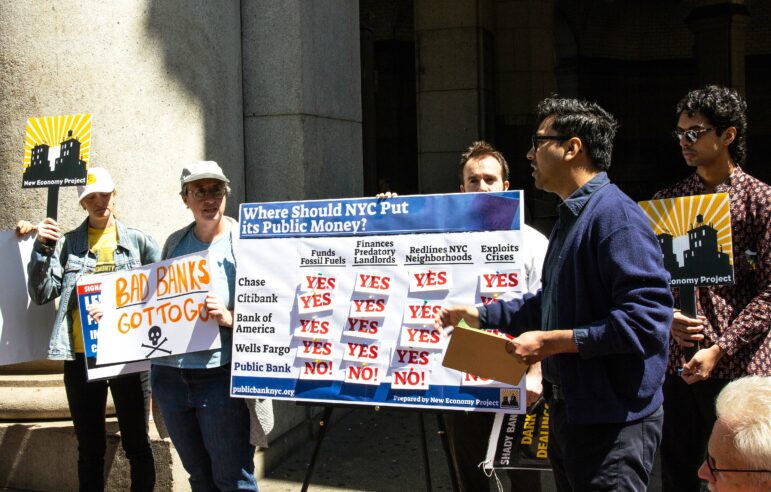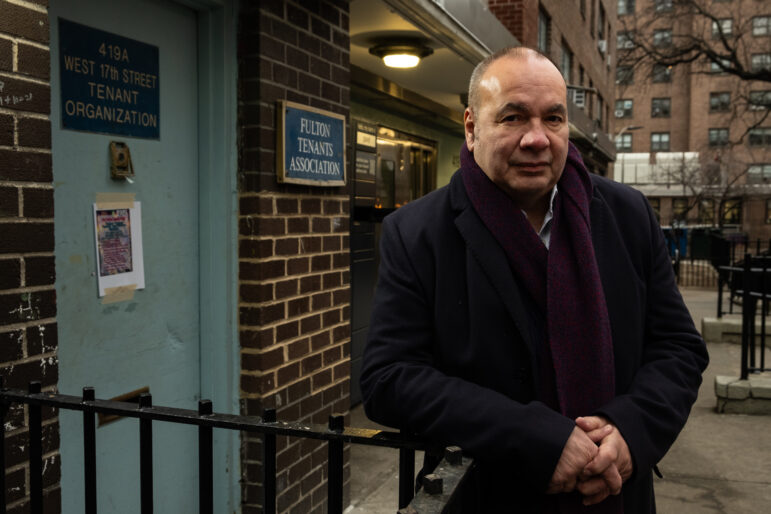It’s a good thing Tony Bennett didn’t leave his heart in New York. He would have gotten palpitations in December, when a group of tenant advocates, armed with a karaoke machine, serenaded the Sheraton New York Hotel with their own lyrics to Bennett’s songs while the crooner himself performed inside at a birthday party. “I left my heart/In the landlords’ pocket/Flush with their cash/I’ll run for Mayor,” they sang to the 65-year-old guest of honor: Bennett’s boyhood friend from Astoria, City Council speaker Peter Vallone.
The picket, staged by New York State Tenants & Neighbors Coalition and the Metropolitan Council on Housing, was a sign of just how anxious advocates are as the city’s rent regulations head toward expiration this April 1. Rent control and stabilization operate under state laws, but the legislation requires the City Council to certify every three years that New York City still needs the regulations. If April Fools Day comes without such a vote from the council, the rent regulations–which limit yearly rent increases on roughly one million regulated apartments and protect tenants from harassment–will disappear.
Tenant organizers are quite worried that the council will try to weaken rent protections, as it did in 1994. But they are also betting that the council they face this time around will hesitate before turning on tenants. Term limits are forcing council members, many of whom have won their district races effortlessly for up to 20 years straight, to seek higher offices–and to do that, they’ll need tenants’ votes. At least 20 current members are thought to have such aspirations. Vallone, for one, is running for mayor. Says Tenants & Neighbors Associate Director Michael McKee, “We think Vallone is going to think better of this because he is running for mayor, and thank goodness. It gives us leverage.”
_______
The elections, however, may also work against tenants. The Rent Stablization Association (RSA), a landlord-backed lobbying group, is eager to see the council mortally wound the rent laws–in 1997, when the regulations came up for renewal in Albany, it doled out at least $40,000 to city candidates, and over $600,000 to state contenders. Both RSA and the Real Estate Board of New York have written members asking them to donate to Vallone. Tenant sources say that Vallone has asked the board for $15 million for his campaign chest.
Even if the council renews the rent laws, it has the power to wreak heavy damage to them. Under state law, the City Council can vote to keep the rent laws as they are or weaken them, but it cannot substantially strengthen them. Last time around, a Vallone-led council voted to deregulate all apartments when their rents reach $2,000 a month–a move that has encouraged landlords to use rent law loopholes to bump rents up over the limit. And the council outraged tenant advocates last June when it voted 36-15 to limit landlords’ liability for lead-paint poisoning.
Vallone has publicly promised to renew the laws. But organizers still fear that the council will take potshots at the law, voting again to lower the maximum rent for regulated apartments or to weaken clauses that protect tenants from harassment. To counter landlord clout, says McKee, “we started strategizing a year and a half ago.” That’s meant nightly phone banks and frequent mailings to tenants in targeted council districts, all aimed, says McKee, at “making sure that the City Council is going to vote the right way.”
At least a dozen council members, many from Manhattan, are considered dependable pro-tenant votes, while some members with few rent-regulated constituents–including Queens’ Archie Spigner and Thomas Ognibene–are sure friends of landlords. Organizers are aiming at middle-of-the-road council members and the leadership, asking tenants to bombard members’ offices with phone calls. The effort has targeted the members in Brooklyn, the Bronx and Queens who cast the swing votes that weakened the laws in 1994. These include Walter McCaffrey and John Sabini of Queens, who both may run for Congress, and Brooklyn’s Annette Robinson, who wants to go to the statehouse. McCaffrey and Robinson voted for decontrol in 1994; Sabini was absent.
Also on the hit list is Brooklyn’s Herbert Berman, who voted to weaken the laws in 1994. He is running for Comptroller in 2001 and needs citywide support. Ken Fisher will also need broad-based support for his potential run for mayor or Brooklyn borough president. Bronx member June Eisland, who voted for decontrol in 1994, is vying for Bronx borough president. As valuable as landlord contributions are, it’s votes that count–and a lot of voters live in rent-regulated apartments. Council members running for higher offices, believes Jenny Laurie, executive director of the Met Council, “will take risks for a real estate contribution, but they won’t take enormous risks.”
Thus, when the callers demand that council members send letters asserting their support of rent regs, many comply, as Sheldon Leffler and Karen Koslowitz–both possible candidates for Queens borough president-have already done. Leffler has been a strong supporter of tenants rights, while Koslowitz voted for the 1999 lead paint bill, but both thought it important to declare their sympathy with tenants early on.
Tenants are more than wiling to use this new-found leverage. Arnold Levey heads the tenants association at North Shore Towers in Little Neck, Queens. Tenants in the 300 rent regulated apartments there have joined Levey in blitzing Berman, Fisher and others with calls. “These people all have political ambitions,” says Levey. “We take the position that as wonderful as they may be, we couldn’t possibly support them if they don’t support the current rent laws.”
But the experiences of 1994 and 1999 suggest that regardless of what other council members want, the speaker will get whatever law he wants passed. “He will get his 26 votes one way or another–what we’re trying to do is surround him with nervous members,” says McKee; the idea is to lobby councilmebers who will then lobby the speaker to keep the laws intact. “Ultimately, the decision is going to be Peter’s.”
While it may secure votes, the council blitz is not gaining McKee or Tenants & Neighbors any friends. “Mike McKee’s group is using this as an organizing tool to keep their troops interested between the battles,” charges Fisher, who says rent regulations aren’t even on the council’s radar yet. “Nobody had bothered to ask to sit down with me to discuss this first-hand. It’s a cheap attempt to scare people,” and perhaps a ploy to raise money, Fisher suggests. An equally skeptical Berman says, “I’m not unconvinced that the reason tenant advocates have gone to this extent to traumatize the people is [because] they want to be the heroes” when rent regs pass unchanged. Fisher and Berman both say they’ll vote for no changes.
Rica Rinzler, a spokesperson for Vallone, says that “he will renew the rent laws. There have been no suggestions for changes.” Privately, one council member refers to claims that Vallone is anti-tenant as “pure unadulterated bullshit.” Apparently, even McKee and Laurie hold out hope for the speaker. Teaming with Councilmember Stanley Michels, they are drafting a bill that will strengthen protections for city tenants by requiring better maintenance of regulated apartments or funding more subsidies for renters.
Even as they remind Vallone and voters of the speaker’s past betrayals, they’re counting on him to play the hero this time around.








